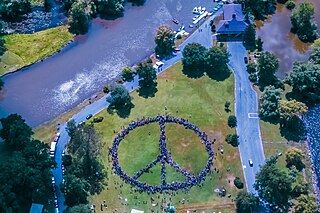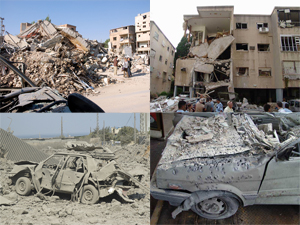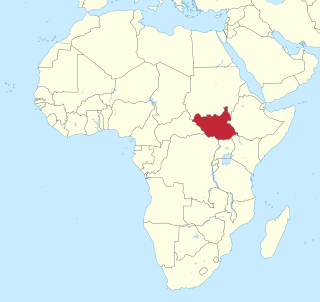A peace process is the set of sociopolitical negotiations, agreements and actions that aim to solve a specific armed conflict.

Peacebuilding is an activity that aims to resolve injustice in nonviolent ways and to transform the cultural and structural conditions that generate deadly or destructive conflict. It revolves around developing constructive personal, group, and political relationships across ethnic, religious, class, national, and racial boundaries. The process includes violence prevention; conflict management, resolution, or transformation; and post-conflict reconciliation or trauma healing before, during, and after any given case of violence.

United Nations Security Council Resolution 1679, adopted unanimously on May 16, 2006, after recalling resolutions 1556 (2004), 1564 (2004), 1574 (2004), 1590 (2005), 1591 (2005), 1593 (2005), 1663 (2005) and 1665 (2006) on the situation in Sudan, the Council endorsed a decision by the African Union Peace and Security Council to move ahead with a United Nations peacekeeping force in Darfur as soon as possible.

United Nations Security Council Resolution 1706, adopted on August 31, 2006, after recalling previous resolutions on the situation in Sudan, including resolutions 1556 (2004), 1564 (2005), 1574 (2004), 1590 (2004), 1591 (2005), 1593 (2004), 1663 (2006), 1665 (2006) and 1679 (2006), the Council expanded the mandate of the United Nations Mission in the Sudan (UNMIS) to include deployments in Darfur to enforce the Darfur Peace Agreement.

The United Nations Peacebuilding Commission (PBC) is a United Nations intergovernmental advisory body of both the General Assembly and the Security Council that supports peace efforts in conflict-affected countries. A key addition to the capacity of the international community in the broad peace agenda, it was established in 2005 with the passage of both A/RES/60/180 and S/RES/1645 Mr. Sérgio França Danese (Brazil) is the incumbent chair of the PBC.
The United Network of Young Peacebuilders (UNOY Peacebuilders) is a global network of young people and youth organisations active in the field of peacebuilding and conflict transformation. UNOY Peacebuilders was founded in 1989 and is working with youth mostly in violent conflict and post war regions. The core activities of UNOY Peacebuilders are capacity building as well as advocacy and campaigning.

The United Nations Department of Political and Peacebuilding Affairs (DPPA) is a department of the Secretariat of the United Nations (UN) with responsibility for monitoring and assessing global political developments and advising and assisting the UN Secretary General and his envoys in the peaceful prevention and resolution of conflict around the world. The department manages field-based political missions in Africa, Central Asia, and the Middle East, and has been increasing its professional capacities in conflict mediation and preventive diplomacy. DPPA also oversees UN electoral assistance to Member States of the organization. Established in 1992, the department's responsibilities also include providing secretariat support to the UN Security Council and two standing committees created by the General Assembly concerning the Rights of the Palestinian People and Decolonization. DPPA is based at the UN Headquarters in New York City.

United Nations Security Council resolution 1170, adopted unanimously on 27 May 1998, after considering the situation across the African continent, the Council decided to establish an ad hoc Working Group to review the Secretary-General Kofi Annan's recommendations concerning the maintenance of international peace and security in Africa.

United Nations Security Council resolution 1197, adopted unanimously on 18 September 1998, after reaffirming its primary responsibility to maintain international peace and security, the Council addressed co-operation efforts with the Organisation of African Unity (OAU).

United Nations Security Council resolution 1318, adopted unanimously on 7 September 2000, after holding a meeting of world leaders on occasion of the Millennium Summit, the Council endorsed the United Nations Millennium Declaration on ensuring an effective role for the Security Council in the maintenance of international peace and security, particularly in Africa.

United Nations Security Council resolution 1366, adopted unanimously on 30 August 2001, after reaffirming resolutions 1196 (1998), 1197 (1998), 1208 (1998), 1265 (1999), 1296 (1999), 1318 (2000), 1325 (2000) and 1327 (2000) concerning aspects of armed conflict, the Council reiterated its aim to prevent armed conflict as part of its responsibility to maintain international peace and security.

United Nations Security Council resolution 1625, adopted unanimously at the 2005 World Summit on 14 September 2005, the Council adopted a declaration on the role of the Security Council in conflict prevention, particularly in Africa where many armed conflicts were taking place.

United Nations Security Council Resolution 1645, adopted unanimously on 20 December 2005, acting concurrently with the United Nations General Assembly, the council established the United Nations Peacebuilding Commission to advise on post-conflict situations, in accordance with the declaration of the 2005 World Summit.

United Nations Security Council Resolution 1983 was adopted unanimously on June 7, 2011, after recalling meetings on HIV/AIDS in Africa and in the mandates of peacekeeping operations, as well as resolutions 1308 (2000), 1325 (2000), 1820 (2008), 1888 (2009), 1889 (2009), 1894 (2009) and 1960 (2010). The Council encouraged the inclusion of HIV/AIDS prevention, treatment, care and support in its peacekeeping mandates.

United Nations Security Council Resolution 1996, adopted unanimously on July 8, 2011, after welcoming the independence of South Sudan from Sudan, the Council established the United Nations Mission in the Republic of South Sudan (UNMISS) for an initial period of one year.

United Nations Security Council Resolution 1719, adopted unanimously on October 25, 2006, after recalling resolutions on the situation in Burundi, including resolutions 1545 (2004), 1577 (2004), 1602 (2005), 1606 (2005), 1650 (2005) and 1692 (2006), the Council established the United Nations Integrated Office in Burundi (BINUB) for an initial period of one year to assist in the country's long-term peace and stability.

United Nations Security Council Resolution 1734, adopted unanimously on December 22, 2006, after recalling all previous resolutions on the situation in Sierra Leone, including resolutions 1620 (2005) and 1688 (2006), the Council renewed the mandate of the United Nations Integrated Office in Sierra Leone (UNIOSIL) until December 31, 2007.
United Nations Security Council Resolution 1809 was unanimously adopted on 16 April 2008.

United Nations Security Council Resolution 2167, concerning the critical role of regional cooperation in International Peacekeeping and Security was adopted unanimously on 28 July 2014. The resolution originated through a debate initiated by the Permanent Representative of Rwanda by sending a letter dated 3 July addressed to the Secretary-General. The 15 member body emphasised that concrete steps should be taken by United Nations and regional organisations to strengthen their relationships and develop more effective partnership. The resolution reaffirms support for African Union and European Union collaboration with peacekeeping operations.

The Office of the Special Representative of the Secretary-General on Sexual Violence in Conflict (OSRSG-SVC) is an office of the United Nations Secretariat tasked with serving the United Nations' spokesperson and political advocate on conflict-related sexual violence, the Special Representative of the Secretary-General on Sexual Violence in Conflict (SRSG-SVC). The Special Representative holds the rank of Under-Secretary-General of the UN and chairs the UN Action Against Sexual Violence in Conflict. The mandate of the SRSG-SVC was established by Security Council Resolution 1888, introduced by Hillary Clinton, and the first Special Representative, Margot Wallström, took office in 2010. The current Special Representative is Pramila Patten of Mauritius, who was appointed by UN Secretary General António Guterres in 2017. The work of the SRSG-SVC is supported by the UN Team of Experts on the Rule of Law/Sexual Violence in Conflict, co-led by the Department of Peacekeeping Operations (DPO), Office of the High Commissioner for Human Rights (OHCHR) and the UN Development Programme (UNDP), also established under Security Council Resolution 1888.















